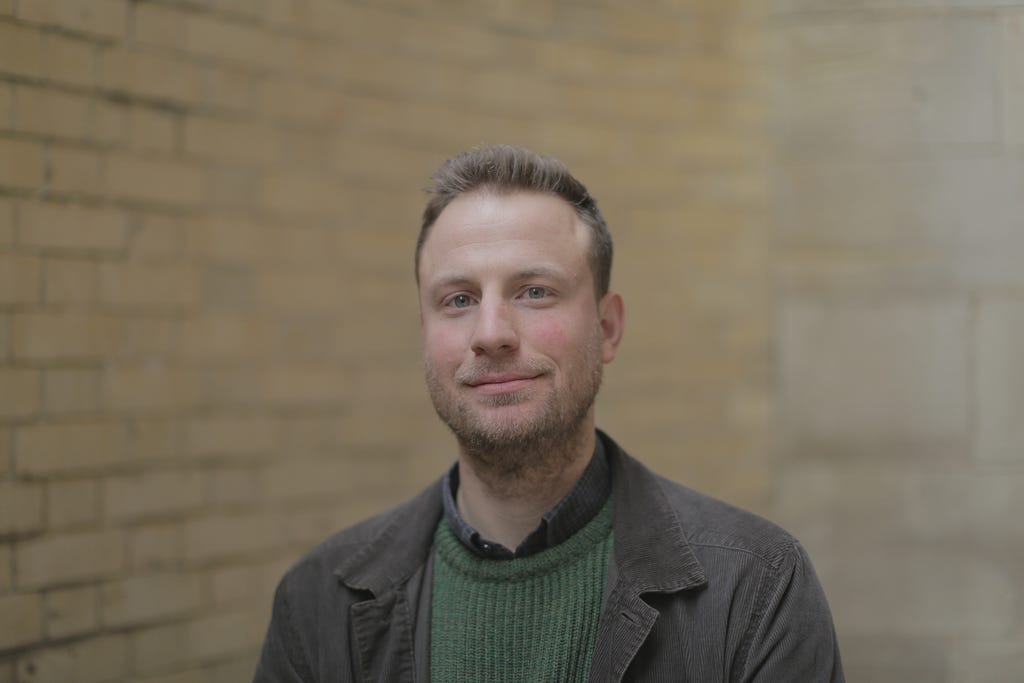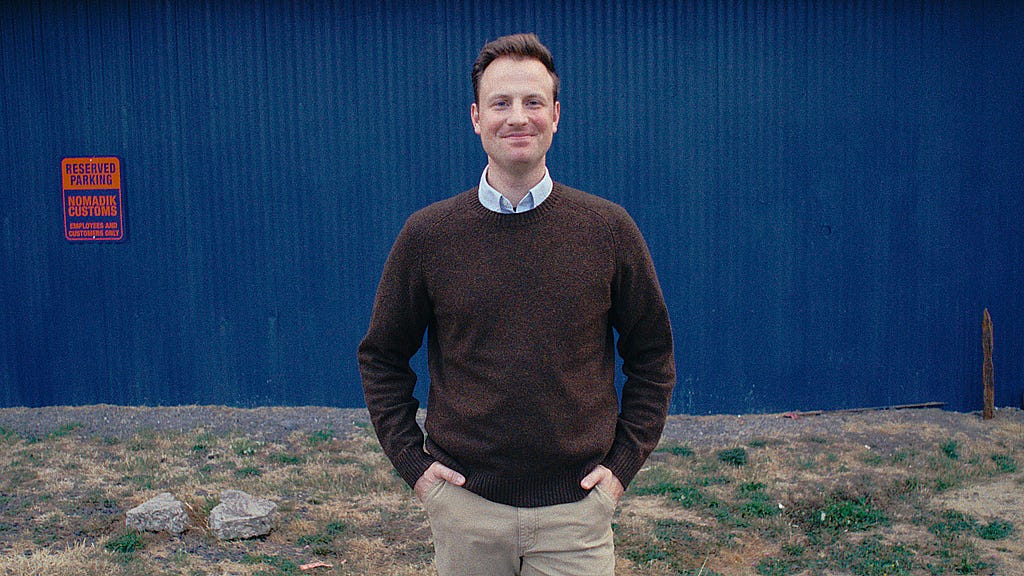
Be wise when you building your crew, go outside your normal circles and find people with new perspectives this will make your films better/more interesting.
As a part of our series called “5 Things I Wish Someone Told Me When I First Became A Filmmaker”, I had the distinct pleasure of interviewing Keith Kopp.
Keith Kopp is an award-winning film director from Portland, Oregon based in Bath, UK He spent five years of his youth in the military figuring out that he was more suited for the film industry than the grunt life. He is interested in themes relating to transformation, redemption and family dynamics. He has just completed his first feature film Translations. His films have screened in film festivals globally and on Sky TV. He was personally mentored by Gus Van Sant on the film Gage. Keith and his writer Laurence Guy are currently developing a feature film with help from the British Film Institute Network.
Thank you so much for joining us in this interview series! Our readers would love to get to know you a bit better. Can you tell us a bit of the ‘backstory’ of how you grew up?
I was raised in the Pacific Northwest in a working class family, my dad was a truck driver and my mother was a stay at home Mom. Storytelling was really important in my family whether it was my father holding court with tales of his youth when my relatives visited us or the family’s interest in cinema. Before I moved to a large city when I was fourteen I lived in the woods and I spent a lot of time by myself using my imagination.
Can you share a story with us about what brought you to this specific career path?
I wan’t very engaged with school as a kid and I used to skip a lot of lessons, I would go to the cinema or watch films on TV at home. After seeing and fallen in love The Graduate, and The Shawshank Redemption on television I thought I would try the unthinkable and make films. I didn’t have idea where to start but the desire really occurred to me when I was about sixteen. After doing an enlistment in the military (to pay for film school) I decided to make my dream a reality and I moved to the UK to become a film director.
Can you share the funniest or most interesting story that occurred to you in the course of your filmmaking career?
I was working on a script while drinking a coffee outside the Soho Theatre in London and while I was daydreaming about how I would cast this film and I see Alan Rickman walk on the other end of the road. I don’t give myself a moment to really think about what I was going to say to him but just start walking towards him shaking a bit. When I reached him I could barely get a whisper out. He turned around and after a brief introduction I offered him a script. He was both utterly charming and cursing (at no one in particular). Though it did not turn out for him to be in my film, it showed me the importance of not being afraid to approach people no matter their skill and notoriety. A very important lesson for a filmmaker.
Who are some of the most interesting people you have interacted with? What was that like? Do you have any stories?
Alongside directing I have also crewed in other roles in Film and Television. You brush shoulders with lots of names, but quite often you are doing a specific task and don’t have time to chat with talent. Actors are probably the most interesting people I interact with on a daily basis in the industry. Their job is exist in a vulnerable state and this means they are very observant and usually have a unique take on life.

None of us are able to achieve success without some help along the way. Is there a particular person who you are grateful towards who helped get you to where you are? Can you share a story about that?
A long time friend and mentor (screenwriter) Robin Mukherjee has helped me many times over the years. Robin is a great filmmaker in his own right (he has written feature films which were developed by the BFI, and several well known UK TV series). He is one of those people who has helped with insight, and support when you need it the most. His kindness assisted me in making my most recent film as well.
Can you please give us your favorite “Life Lesson Quote”? Can you share how that was relevant to you in your life?
I always really liked the Henry Ford quote “ The only real mistake is the one from which we learn nothing”. Filmmaking is about experimentation and discovering what works and what doesn’t. Failure is actively apart of the of the process. This may come from in form of rewriting, developing visual style once you have come to the location or editing to make a scene better than initially planned. The best directors are those who embrace the adaptation.
I am very interested in diversity in the entertainment industry. Can you share three reasons with our readers about why you think it’s important to have diversity represented in film and television? How can that potentially affect our culture?
- New perspectives mean new voices and unique stories.
- We can’t fool ourselves into believing we live in a fair society if a group is excluded in our artistic medium.
- We exist in a time where small groups matter to large platforms/distributors because reaching them is possible in a way it has been before. Broad film/TV is not the key at the moment, if you want to succeed you really need to think about regions outside of capital cities, diverse populations and unexplored cultures. This also has to be authentic.
What are some of the most interesting or exciting projects you are working on now?
I have just completed my debut feature film Translations. It’s a Welsh romance drama that focuses on love between two people facing challenges with their mental health. The film is a character study about a young woman (Stef) battling agoraphobia and finding herself facing a choice between a relationship and good health. It stars some amazing up and coming cast Alan Emrys (Young Wallander, Host) and Kate Morgan-Jones (The Pact). I am really excited to share this work with an audience. I am now developing my second feature film with the same writer (Laurence Guy) on a Christmas dramedy film that we are hoping to develop with a company in the UK.
Which aspect of your work makes you most proud? Can you explain or give a story?
When a film has a tie to something that is real and meaningful it makes my experience even more special. I made a film called Gage about a real neurological case about a man called Phineas Gage. In this film I had the joy of making a story about neurodisabilities and the challenges faced by those dealing with this in a period drama western. I also had the pleasure to do some research with doctors at the neurodisability hospital in Putney and to understand how people are affected by traumatic brain injuries.
Ok super. Here is the main question of our interview. What are your “5 things I wish someone told me when I first started” and why. Please share a story or example for each.
- Your artistic voice will come, do not stress about this, just keep making films and it will develop.
- Understand the actors process and then technical filming. Performance is king to a good film.
- Be wise when you building your crew, go outside your normal circles and find people with new perspectives this will make your films better/more interesting.
- Appreciate everyone that helps you! Don’t forget that you aren’t the centre of the universe.
- Money and business is a factor of filmmaking, not mater what role you do, so learn about it now!
When you create a film, which stakeholders have the greatest impact on the artistic and cinematic choices you make? Is it the viewers, the critics, the financiers, or your own personal artistic vision? Can you share a story with us or give an example about what you mean?
Making a film is a very long process, to start with you have to be very emotionally invested in the project. So I guess you can say my own interest and artistic draw to a story during the inception phase. Then there are the real world practicalities of making a film, so money and time is where outside influences come in and can influence which of the many projects get selected.
There is always a balance for what artistically I want to achieve when making a story and what an audience will enjoy/engage with. A director is the first audience member of his/her/their film, so they need think beyond do I like this and ask them selves will other enjoy it. For instance I created a few improvised moments in my film Translations which were going to be a montage introducing my central character. It felt raw and engaging when I was shooting it and then in the edit I felt as though I had two beginnings to the film and I knew that I would loose the audience’s interest so I decided in the end to cut it from the film.
You are a person of great influence. If you could start a movement that would bring the most amount of good to the most amount of people, what would that be? You never know what your idea can trigger. 🙂
I am a big believer in respecting other people. So much can be accomplished in this world if we were more kinder and communicative. So in short listen to others and trying to understand other peoples perspectives. I do try to practice this in my everyday life.
We are very blessed that some of the biggest names in Business, VC funding, Sports, and Entertainment read this column. Is there a person in the world, or in the US whom you would love to have a private breakfast or lunch with, and why? He or she might see this. 🙂
I would love to have a coffee with Tim Cook (CEO Apple +) because I really admire their platform and the films and televisions series they choose the green light/ curate. I would love to speak with him about Apple+ commissioning choices and where he sees their platforms evolving, and naturally some of the work that my writer Laurence guy and I are developing.
How can our readers further follow you online?
Instagram — @Keith_Wilhelm_Kopp
YouTube- https://www.youtube.com/channel/UCSewq6XRB3cTbqw-uWUkfBA
Website — kwkopp.com
This was very meaningful, thank you so much! We wish you continued success!
Keith Kopp: 5 Things I Wish Someone Told Me When I First Became A Filmmaker was originally published in Authority Magazine on Medium, where people are continuing the conversation by highlighting and responding to this story.
